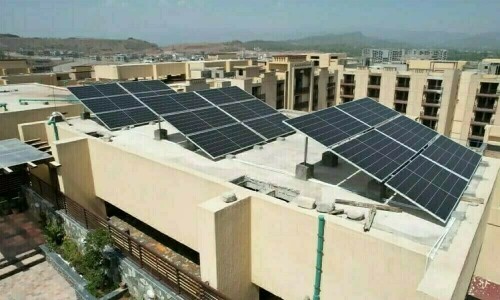Potential Solar Panel Import Cost Increase in Pakistan
Pakistani importers have voiced concerns that the ongoing tensions between Iran and Israel could lead to increased costs for solar panel imports. These concerns were shared with Business Recorder on Tuesday.
While Israeli operations in Gaza have been ongoing for approximately 18 months, a recent escalation involving attacks on Iran that started on June 13 has heightened concerns. Israel has stated that these actions were taken due to Iran’s alleged pursuit of nuclear weapons development. Iran has responded with missile and drone strikes, asserting that its nuclear program is strictly for peaceful applications.
After two weeks of conflict, US President Donald Trump announced a ceasefire agreement between Iran and Israel. He urged both nations to adhere to the truce. Despite this, the Gaza situation remains unresolved, and the possibility of renewed clashes between Iran and Israel looms.
Muhammad Faaz Diwan, Director at Diwan International Pvt Ltd, stated that shipping expenses to Pakistan are currently around $2,500 per container. He cautioned that an escalation in the Middle East conflict could push this figure up to $3,000 per container.
According to Diwan, freight costs have already more than doubled in the past two months, rising from $1,200 to $2,500. He attributed this increase to the imposition of duties by the US on Chinese goods, which were subsequently suspended for a 90-day period. This suspension led to a surge in orders from the US to China, consequently driving up freight charges.
Diwan anticipates further increases in freight expenses if the Iran-Israel conflict continues. He also noted that importers are currently paying an additional 3% advance tax on imports.
“The total tax burden on importers would reach 13%, leading to higher solar panel prices if a 10% tax is imposed on solar panels,” he cautioned.
The government’s budget proposals for FY2025-26 initially suggested an 18% tax on imported solar panels, which was later reduced to 10%.
Diwan pointed out that the cost per watt of a solar panel is approximately Rs28. A 13% tax would increase this cost to Rs32 per watt for importers.
He noted that Pakistani citizens are struggling with high electricity costs and frequent power outages, leading many to adopt solar panels.
However, he believes that even with the tax, solar panels will remain affordable for consumers when considering long-term savings.
Addressing Finance Minister Muhammad Aurangzeb’s accusations of hoarding and artificial shortages by traders, Diwan refuted the claims. He argued that if hoarding were occurring, solar panel prices would have already risen significantly, which has not been the case.
Regarding local solar panel manufacturing, Diwan stated that approximately 98% of solar panels used in Pakistan are imported.
“The remaining 2% are locally made but substandard, mainly used in rural areas or for small-scale needs. These panels have low durability.”
He emphasized that imposing any duties on solar panels is inadvisable until a top-tier 1 manufacturing facility is established in Pakistan.
“Once a tier-1 factory is operational in Pakistan, the government can then impose GST [goods and services tax] and import duties to encourage local competition,” Diwan said.
“Imposing taxes on panels without local manufacturing is equivalent to blocking the entry of high-quality products into Pakistan.”
‘Massive demand, lack of clarity on taxation’
Inverex CEO Muhammad Zakir Ali told that Pakistan imported 17 gigawatts worth of solar panels in 2024. Imports have already reached 8 gigawatts so far in 2025, according to Ali.
He explained that demand for solar panels in Pakistan was very high due to rising electricity rates and frequent load shedding, pushing people to shift towards alternative energy sources.
Speaking about alternative energy, Ali stressed the need for clarity in taxation policies, as the government’s announcement of 18% tax, followed by a reduction to 10%, created confusion among people.
He also stated that setting up a solar panel industry in Pakistan had become inevitable.
“Currently, 95% of the solar panels used in the country are imported, and the remaining 5% are not up to international standards.”
Ali emphasised that establishing such an industry would create employment opportunities and enable Pakistan to meet its growing demand locally.
‘Need for immediate local manufacturing and financing’
Fusion Tech chairman Salim Memon stressed that local manufacturing must begin at the earliest to meet the country’s rising demand for solar panels.
He also urged the government to introduce bank financing schemes for solar panels to make green energy accessible to the common man.
He highlighted the need for complete local manufacturing—from solar panels to inverters, and criticised the current practice saying what was referred to as ‘manufacturing’ in Pakistan was “merely assembling”.
Memon stressed that the time had come for Pakistan to initiate a true solar panel manufacturing industry.



Comments (0)
No comments yet. Be the first to comment!
Leave a Comment